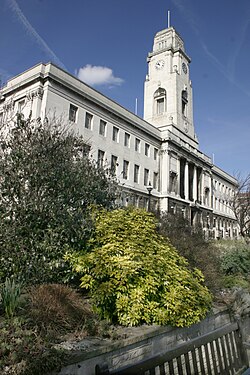| Barnsley Town Hall | |
|---|---|
 Barnsley Town Hall Barnsley Town Hall | |
| Location | Barnsley |
| Coordinates | 53°33′15″N 1°28′58″W / 53.5542°N 1.4827°W / 53.5542; -1.4827 |
| Built | 1933 |
| Architect | Sir Arnold Thornely |
| Architectural style(s) | Classical style |
| Website | www |
| Listed Building – Grade II | |
| Designated | 13 January 1986 |
| Reference no. | 1151143 |
 | |
Barnsley Town Hall is the seat of local government in the Metropolitan Borough of Barnsley, South Yorkshire, England. It is a Grade II listed building.
Building
Design and construction
The site selected for the new building in Church Street had previously been occupied by a row of domestic properties. The foundation stone for the building was laid by Councillor Robert Plummer, a former mayor, on 21 April 1932. The facility, which was designed by Sir Arnold Thornely in the classical style and built of Portland stone at a cost of was £148,697, was officially opened by the Prince of Wales on 14 December 1933. The design included a large Corinthian distyle with pilasters on the first and second floors of the building as well as a 44 metres (144 ft) high three-stage reducing central tower, incorporating a public clock by Gillett & Johnston.
George Orwell, in his book The Road to Wigan Pier, was highly critical of this expenditure, and said that the council should have spent the money on improving the housing and living conditions of the local miners.
Museum
In June 2013, Experience Barnsley, a museum dedicated to the history of the town and its people, which had previously been based in the old Central Library, moved into a part of the town hall which had been designated the "Experience Barnsley Museum and Discovery Centre". Exhibits put on display include a 5,000 year old axe head which was found at the Scout Dyke Reservoir near Penistone in the 1920s.
Adjacent to the building
War memorial
The war memorial in front of the building, which predates the town hall, was sculpted by John Tweed and was unveiled at a ceremony attended by General Sir Charles Harington on 11 October 1925.
Barnsley Pals Centenary Square
In September 2013 the Earl of Wessex, officially opened the Barnsley Pals Centenary Square on the south side of the town hall, which commemorates the lives of the Barnsley Pals who died in the First World War.
Visitors
Queen Elizabeth II, accompanied by the Duke of Edinburgh, visited the town hall and signed the visitors' book on 27 October 1954; the Royal Standard was flown from the mast on the central tower of the town hall during her visit.
See also
References
- ^ Historic England. "Town Hall including attached railings (1151143)". National Heritage List for England. Retrieved 24 July 2020.
- "Views of Old Barnsley" (PDF). Barnsley Art On Your Doorstep. p. 313. Retrieved 24 July 2020.
- "Timeline History of Barnsley". Visitor UK. Retrieved 24 July 2020.
- "Will Barnsley have the last laugh?". The Telegraph. 18 May 2002. Retrieved 24 July 2020.
- "Advertisement: The Horological Journal, August 1939".
- Orwell, George (2015). A Kind Of Compulsion: 1903 - 1936. Secker. p. 558. ISBN 978-1846559457.
total cost of new Town hall was £148,697 and was incurred at a time when the town admittedly needed over 2000 houses, not to mention public baths.
- "Barnsley Archives and Local Studies achieves national accreditation". Experience Barnsley. Retrieved 24 July 2020.
- "Barnsley, the bold as brass town where Sir Michael Parkinson was born and the Arctic Monkeys studied". Yorkshire Post. 2 May 2020. Retrieved 24 July 2020.
- "Neolithic axe head in new museum Experience Barnsley". BBC. 27 June 2013. Retrieved 24 July 2020.
- "Barnsley". Imperial War Museum. Retrieved 24 July 2020.
- "Prince Edward honours Barnlsey Pals". Yorkshire Post. 16 September 2013. Retrieved 24 July 2020.
- "Queen Elizabeth II visits Barnsley". Barnsley Museums. 27 October 1954. Archived from the original on 19 December 2021. Retrieved 24 July 2020.
- "Queen Elizabeth II visits Yorkshire". Yorkshire Film Archive. 27 October 1954. Retrieved 24 July 2020.